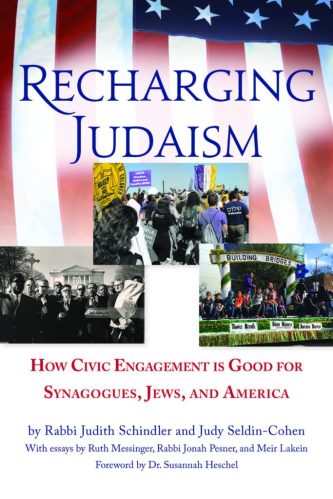
Rabbi Andrue J. Kahn, editor of The Sacred Earth: Jewish Perspectives on Our Planet, reflects on the inspiration behind the project, the unique approaches taken by the book’s contributors, and why Jews can play an essential role in the fight against climate change.
How did you get interested in the topic of climate change?
I have always found nature to be a source of spiritual richness. Growing up in Tacoma, Washington, a particularly beautiful part of our country, I sought out the sense of gravity, mystery, and wonder in our parks and beaches. As I grew older, I maintained that sense of connectedness to wild spaces, but never really considered the place of Judaism within that nexus. As associate rabbi at Temple Emanu-El, I was approached by a particularly passionate congregant, the indefatigable Peg Watson, who wanted to push our community to get more involved in environmental justice. She connected us with Karenna Gore at the Center for Earth Ethics, and through many conversations and much planning, it became clear to me that the best way to awaken our community towards greater commitment to and involvement in protecting our ecosystem was to cultivate resources for individuals to connect their Jewish identity and practice more closely with the more-than-human world of plants and animals, mountains and oceans, and forests and deserts.
What can readers learn from The Sacred Earth?
The most important lesson within The Sacred Earth, reiterated throughout every page, is that Judaism has always seen humanity as part of the intricate web of intermeshing life on this planet, and that God is the creator of the entire system. Many have posited that Judaism has no Earth-based ethic due to our exile from the land of Israel, the geographic locus of our genesis as a people. In reality, this volume helps us see that our state of exile has given us a valuable viewpoint on humanity’s relationship to the planet. Our presence in every ecosystem—and our ability to be contributors and partners with others in guarding and tending the land—has given us a global perspective well before globalism became the norm.
Can you describe some of the different approaches taken by contributors to The Sacred Earth?
The Sacred Earth is as full of approaches as it is of contributors! From poetry, to reflective biographical essays, to halachic thought, to kabbalistic mysticism, to practical guides for ritual practices, each chapter is its own gateway into more deeply understanding our role as Jews on our shared planet.
Why is it important that we, as Jews, engage in environmental activism?
Just as is true with so many other justice causes, environmental activism is deeply important for the Jewish people to engage in both for our own interests, and for the wider interests of the world. We are part of the wider network of communities that links all people and places throughout the planet, and are therefore responsible for maintaining that system. Beyond our universal commitments, the truth is that Jews all over the world are and will continue to be deeply impacted by the ongoing climate shifts. Even our ancestral and spiritual homeland itself is at deep risk of being uninhabitable within my lifetime if we continue trending towards greater rise in global temperature. Finally, our Torah teaches us that humanity was charged with the responsibility of guarding and tending the world, and there is no better way to maintain our connection to this mitzvah than to join with our fellow humans in working to protect against further destruction.
What gives you hope that we can rise to the challenge of addressing climate change?
When I look at the history of our people and our resilience in the face of thousands of years of challenges, it becomes clear that the Jewish people’s ability to survive and thrive everywhere and everywhen is undeniable. The unsustainable practices that have led to climate change will inevitably lead to their own demise. Our beautiful planet is incredibly resilient, if on its own timeline rather than a human timeline. Ultimately, the question is whether we as a species are willing and able to change how we approach our planet, our relationship to its inhabitants, and our modes and methods of consumption before we are forced by the ongoing shifts to make the changes under duress. What gives me the greatest hope in the face of these challenges are the many people who are devoting their lives to changing minds, hearts, and systems. The Sacred Earth is full of the thought and passion of just these kinds of people, tzaddikimin our midst, and I believe that whether we change by choice, or change by force, these tzaddikim will continue to work towards a better, more just world.
Rabbi Kahn and select contributors to The Sacred Earth are available to visit communities for speaker events and book clubs. For more information, please email bookevents@ccarpress.org.
Rabbi Andrue J. Kahn is Associate Director of Yachad and Adult Education at Congregation Beth Elohim in Brooklyn, NY. He is the editor of The Sacred Earth: Jewish Perspectives on Our Planet (CCAR Press, 2023).


















